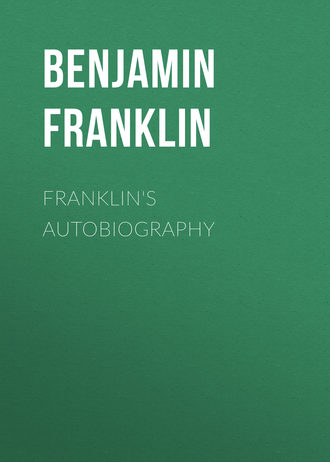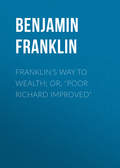
Бенджамин Франклин
Franklin's Autobiography
PROVERBS FROM POOR RICHARD'S ALMANAC
The noblest question in the world is, What good may I do in it?
The masterpiece of man is to live to the purpose.
The nearest way to come at glory is to do that for conscience which we do for glory.
Do not do that which you would not have known.
Well done is better than well said.
Who has deceived thee so oft as thyself?
Search others for their virtues, thyself for thy vices.
He that can have patience, can have what he will.
After crosses and losses men grow humbler and wiser.
In a discreet man's mouth a public thing is private.
Wealth is not his that has it, but his that enjoys it.
No better relation than a prudent and faithful friend.
He that can compose himself is wiser than he that composes books.
He that can take rest is greater than he that can take cities.
None but the well-bred man knows how to confess a fault, or acknowledge himself in error.
Read much, but not too many books.
None preaches better than the ant, and she says nothing.
Forewarned, forearmed.
To whom thy secret thou dost tell,
To him thy freedom thou dost sell.
Don't misinform your doctor or your lawyer.
He that pursues two hens at once, does not catch one and lets the other go.
The worst wheel of the cart makes the most noise.
There are no gains without pains.
If you know how to spend less than you get, you have the philosopher's stone.
Every little makes a mickle.
He that can travel well a-foot keeps a good horse.
He is no clown that drives the plow, but he that doth clownish things.
NOTES AND SUGGESTIONS
Though he did not consider himself a man of letters, Franklin was throughout his long life a writer. His writing was incidental to his business as a journalist and statesman. He also corresponded widely with various classes of people. Fortunately many of these writings have been preserved, and from these and the Autobiography a number of valuable lives have been written. The student will find pleasure in referring to the Franklin volumes of the American Statesmen Series and of the American Men of Letters Series. The three volume life by Mr. John Bigelow and the one volume, The Many-sided Franklin, by Paul Leicester Ford, will supply the years of Franklin's life not included in his autobiography, the writing of which was several times interrupted by public business of the greatest importance, and finally cut short by the long illness that preceded his death.
Read the pages devoted to Franklin in Brander Matthews' Introduction to American Literature. Matthews says of him, "He was the first great American – for Washington was twenty-six years younger." "He was the only man who signed the Declaration of Independence, the Treaty of Alliance with France, the Treaty of Peace with England, and the Constitution under which we still live."
As you read Franklin's pages be on the alert for material to support Mr. Matthews' statement, "Franklin was the first of American humorists, and to this day he has not been surpassed in his own line." Will one of you report to the class on "Franklin's Humor"?
Franklin was far in advance of his times on many questions. In 1783, when concluding the Treaty of Peace with England, he tried to secure the adoption of a clause protecting the property of non-belligerents in subsequent wars. England would not accept this advanced idea, but Frederick II of Prussia agreed to it, and since that time all civilized governments have united in embodying it in the Law of Nations.
Franklin was one of the first and, in proportion to his means, one of the greatest of American philanthropists. He said that he had "a trick for doing a deal of good with a little money." In lending some money to one who had applied to him for assistance, he instructed the borrower to pass it on to some one else in distress as soon as he could afford to repay it. "I hope it may thus go through many hands, before it meets with a knave that will stop its progress."
Mr. Bigelow's Life of Franklin reproduces the philosopher's exact spelling. He was one of the early spelling reformers. See his "Petition of the Letter Z," p. 116, The Many-sided Franklin.
(In the following notes the numerals refer to the pages of the text.)
Page 17. "Ecton, in Northamptonshire." In 1657 George Washington's grandfather emigrated to Virginia from this same English county.
"Franklin, … an order of people." Do you recall one of the titles of Cedric, the Saxon, in Scott's Ivanhoe?
27. Notice his judgment regarding controversy. It will be profitable, from time to time, to consider his remarks as throwing light on the subject, "Franklin, a Manager of Men."
28. Read carefully the paragraph opening with a reference to The Spectator, and using Franklin's method, reproduce that paragraph. Apply this method to other good English selections and try to adapt it to your translations from other languages.
As you read Franklin's account of his self-education, ask yourself what quality it is in the student that gives best assurance of final success in securing a real education.
34. Is Franklin's use of the word "demeaned" good?
37. In his reference to Bunyan and Defoe, Franklin proves himself one of the first critics to recognize those writers as the fathers of the modern novel.
38. "Our acquaintance continued as long as he lived." Few men have placed a higher value on friends than did Franklin. He took the trouble necessary to make friends and to keep them.
61. Read parts of Young's Night Thoughts.
77. Carefully observe the plan of the Junto and its subordinate branches, and consider the value of such organizations for yourself and friends. By referring to Bigelow's Life of Franklin, Vol. I, p, 185, you will find detailed information concerning the rules of the Junto.
81. Years later, while in London in 1773, Franklin showed his ability with his pen and put through a successful journalistic hoax. He published in The Public Advertiser what was for a time accepted by many as an authentic edict of the King of Prussia. In this the king held that the English were German colonists settled in Britain, and that they should be taxed for the benefit of the Prussian coffers.
What claims were the English making in 1773? By looking through other lives of Franklin, you may find an account of another literary hoax by which he helped the American cause.
86. Franklin's original determination to secure money with his wife should be judged by the standards of his time.
89. Beginning with the establishment of the Philadelphia public library, keep a list of Franklin's plans and achievements for the public good.
92. The high honors accorded to Franklin by foreign nations have never been extended to any other American, with the possible exception of Theodore Roosevelt.
111. Franklin's boyhood debate on the subject of the education of young women is reflected here as a settled conviction.
113. The great scholar and historian, Gibbon, agreed with Franklin concerning the languages.
115. "Inoculation." Will you volunteer to make a report to the class on inoculation and vaccination? The two combine in making one of the most interesting chapters in the history of medical science.
117. You will be interested in comparing the constable's watch of ragamuffins with the watch in Shakespeare's Much Ado About Nothing.
118. In many towns and cities there is much of interest connected with the fire department. "The History of Our Fire Department," "Fire Fighting," and many other subjects may suggest themselves to you for written or oral reports. Possibly some one in the class may be able to tell in this connection how Crassus, the friend of Julius Cæsar, gained a great part of his wealth.
119. Have you read of the work of Whitefield and his associates in England? See "The Methodist Movement" in Halleck's History of English Literature, or in some good English history.
132. Your classmates will be interested in a report on the Franklin stove. Make some simple drawings to illustrate its principles.
141. Find out definitely what system of street cleaning prevails in your home town. Write a feature article on that system, as if for a magazine. Some member of the class who has a camera will secure illustrations for you. Also write an editorial for a newspaper, an editorial inspired by the disclosures of the feature article.
175. Will several of you take up the subject of "Franklin's Electrical Experiments" and make reports to the class?
185. Notice Franklin's alertness in suggesting the application of scientific methods to practical affairs. Do you think that Emerson's definition of "genius" as given in the first paragraph of his essay on "Self-Reliance" can be justly applied to Franklin?
You will be interested in following Franklin's experiments in determining the value of oil in stilling the waves, and also his investigations of the Gulf Stream and of the nature of storms. He asked, "What signifies philosophy that does not apply to some use?" Yet he had a wonderful imagination back of his practical nature.
Emerson says that the chief use of a book is to inspire. On this basis how do you rank the Autobiography in usefulness?
ECLECTIC ENGLISH CLASSICS
Addison's Sir Roger de Coverley Papers (Underwood)
Arnold's Sohrab and Rustum (Tanner)
Bunyan's Pilgrim's Progress (Jones and Arnold)
Burke's Conciliation with America (Clark)
Speeches at Bristol (Bergin)
Burns's Poems – Selections (Venable)
Byron's Childe Harold (Canto IV), Prisoner of Chillon, Mazeppa, and other Selections (Venable)
Carlyle's Essay on Burns (Miller)
Chaucer's Prologue and Knighte's Tale (Van Dyke)
Coleridge's Rime of the Ancient Mariner (Garrigues)
Cooper's Pilot (Watrous)
The Spy (Barnes)
Defoe's History of the Plague in London (Syle)
Robinson Crusoe (Stephens)
De Quincey's Revolt of the Tartars
Dickens's Christmas Carol and Cricket on the Hearth (Wannamaker)
Tale of Two Cities (Pearce)
Dryden's Palamon and Arcite (Bates)
Eliot's Silas Marner (McKitrick)
Emerson's American Scholar, Self-Reliance, Compensation (Smith)
Franklin's Autobiography (Reid)
Goldsmith's Vicar of Wakefield (Hansen)
Deserted Village (See Gray's Elegy)
Gray's Elegy in a Country Churchyard, and Goldsmith's Deserted Village (Van Dyke)
Hughes's Tom Brown's School Days (Gosling).
Irving's Sketch Book – Selections (St. John)
Tales of a Traveler (Rutland)
Lincoln's Addresses and Letters (Moores)
Address at Cooper Union (See Macaulay's Speeches on Copyright)
Macaulay's Essay on Addison (Matthews)
Essay on Milton (Mead)
Essays on Lord Clive and Warren Hastings (Holmes)
Lays of Ancient Rome and other Poems (Atkinson)
Life of Johnson (Lucas)
Speeches on Copyright, and Lincoln's Address at Cooper Union (Pittenger)
Milton's L'Allegro, Il Penseroso, Comus, Lycidas (Buck)
Paradise Lost. Books I and II (Stephens)
Old Ballads (Morton).
Old Testament Narratives (Baldwin)
Poe's Selected Poems and Tales (Stott)
Pope's Homer's Iliad. Books I, VI, XXII, and XXIV Rape of the Lock and Essay on Man (Van Dyke)
Ruskin's Sesame and Lilies (Rounds)
Scott's Abbot
Ivanhoe (Schreiber)
Lady of the Lake (Bacon)
Marmion (Coblentz)
Quentin Durward (Norris)
Woodstock
Shakespeare's As You Like It (North)
Hamlet (Shower)
Henry V (Law)
Julius Cæsar (Baker)
Macbeth (Livengood)
Merchant of Venice (Blakely)
Midsummer Night's Bream (Haney)
The Tempest (Barley)
Twelfth Night (Weld)
Southey's Life of Nelson
Stevenson's Inland Voyage and Travels with a Donkey (Armstrong)
Treasure Island (Fairley)
Swift's Gulliver's Travels (Gaston)
Tennyson's Idylls of the King – Selections (Willard)
Princess (Shryock)
Thackeray's Henry Esmond (Bissell)
Washington's Farewell Address, and Webster's First Bunker Hill Oration (Lewis)
Webster's Bunker Hill Orations (See also Washington's Farewell Address)
Wordsworth's Poems – Selections (Venable)



